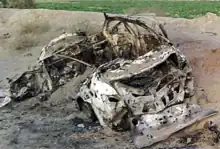Death of Akhtar Mansour
On 21 May 2016, Akhtar Mansour was killed in a U.S. military drone strike on the N-40 National Highway in Pakistan[1] near Ahmad Wal, not far from the Pakistan–Afghanistan border; Mansour had crossed earlier that day from Iran into Pakistan through the Taftan, Balochistan, border crossing, some 450 kilometres (280 mi) away from the spot where he was killed.[2][3][4]
| Death of Akhtar Mansour | |||||||
|---|---|---|---|---|---|---|---|
| Part of the War in Afghanistan and the Drone strikes in Pakistan | |||||||
 | |||||||
| |||||||
| Belligerents | |||||||
| United States |
| ||||||
| Commanders and leaders | |||||||
|
Barack Obama John Kerry | Akhtar Mansour † | ||||||
| Units involved | |||||||
| Unknown | Military of the Taliban | ||||||
| Strength | |||||||
| Unknown | |||||||
| Casualties and losses | |||||||
| None |
3 killed
| ||||||
The following day, U.S. Secretary of State John Kerry announced that the United States had "conducted a precision airstrike that targeted Taliban leader Mullah Mansour in a remote area of the Afghanistan–Pakistan border" against Mansour that had likely killed him, and stated that Mansour "posed a continuing, imminent threat" to U.S. personnel and Afghans.[5]
On 23 May 2016, U.S. President Barack Obama confirmed that Mansour had been killed in the American airstrike that he had sanctioned, and stated that Mansour had been planning attacks against U.S. targets in Kabul.[6] Obama stated afterwards that he had hoped Mansour's death would lead to the Taliban joining a peace process.[7][8] The death of Mansour was also later officially confirmed separately by the Afghan government and members of the Taliban.[2][6]
Incident
Mansour had crossed into Pakistan posing as a Pakistani citizen, using forged identity documents (a Pakistani passport and national ID card under the name "Muhammad Wali.")[9] The false passport showed that Mansour had entered Iran on 28 March.[2] Mansour and his taxi driver were both killed in the strike[9][10] against the Toyota Corolla, which was struck by two Hellfire missiles launched by Reaper drones that had evaded Pakistani radar.[1]
Succession and impact
Mansour was succeeded as Taliban leader by Hibatullah Akhundzada.[11]
Some U.S. officials had been divided over Mansour's intentions.[1] Some believed that Mansour could have brought the Taliban to the negotiating table, potentially speeding up the reconciliation process; others, by contrast, "were highly skeptical of Mansour's commitment to talks," noting that Mansour had a long history of authorizing suicide attacks, including in the weeks before the drone strike (such as the April 2016 Kabul attack, which killed more than 60 people), and that even as Mansour was agreeing to secret direct peace negotiations, he had rejected international peace efforts.[10][12][13][14][15] According to the International Institute for Counter-Terrorism, U.S. officials stated that Mullah Mansour's death was "unavoidable" due to the then Emir being unwilling to engage in peace talks.[16][17][18]
References
- Donati, Jessica; Entous, Adam (25 May 2015). "How the U.S. Tracked and Killed the Leader of the Taliban". WSJ. Retrieved 12 April 2023.
- Boone, Jon; Rasmussen, Sune Engel (22 May 2016). "US drone strike in Pakistan kills Taliban leader Mullah Mansoor". The Guardian.
- "Taliban leader Mullah Akhtar Mansour killed, Afghans confirm". BBC News. Retrieved 22 May 2016.
- Baloch, Kiyya; Boone, Jon (29 May 2016). "Family of driver killed in US strike on Taliban leader file criminal case". The Guardian. Retrieved 30 May 2016.
- Wroughton, Lesley (22 May 2016). Birsel, Robert (ed.). "Kerry says Taliban leader Mansour posed a 'continuing imminent threat'". Reuters. Retrieved 12 April 2023.
- Ahmad, Jibran; Landay, Jonathan (21 May 2016). "U.S. says late Taliban leader was planning attacks on Americans". Reuters.
- Spetalnick, Matt; Petty, Martin (23 May 2016). Tait, Paul (ed.). "Obama confirms Afghan Taliban leader's death, says chance for peace". Reuters. Hanoi.
- Brook, Tom Vanden (21 May 2016). "Taliban leader Mansoor killed by U.S. drone". USA Today.
- Baloch, Kiyya; Boone, Jon (29 May 2016). "Family of driver killed in US strike on Taliban leader file criminal case". The Guardian. Guardian News & Media Limited. Retrieved 30 May 2016.
- Jaffe, Greg; Ryan, Missy (24 March 2016). "A Dubai shopping trip and a missed chance to capture the head of the Taliban". The Washington Post.
How and why the United States came to kill a man that some officials believed could bring the Taliban to the negotiating table reveals unresolved questions that have plagued the war
- "Afghan Taliban announce successor to Mullah Mansour". BBC News. 26 May 2015. Retrieved 26 May 2016.
- Ali, Ashraf (30 May 2016). "Mullah Akhtar Mansour: How the CIA's hit on Taliban leader could unleash terror group hardliners". ABC News.
- Rahim, Fazul; Yusufzai, Mushtaq; Bruton, Brinley (7 June 2016). "Analysis: Why Afghanistan Peace Prospects Look Worse After Mansour's Death". NBC News.
- Dam, Bette (1 August 2015). "Mullah Akhtar Mansoor: Taliban's new leader has reputation for moderation". The Guardian.
- Mashal, Mujib; Masood, Salman (16 August 2019). "Bomb Strikes Mosque Frequented by Afghan Taliban Chief". The New York Times.
- Qazi, Shereena (26 May 2016). "Who is new Taliban leader Mullah Haibatullah Akhunzada?". Al Jazeera. Al Jazeera Media Network. Retrieved 4 December 2019.
- "Implications Resulting from the Death of Mullah Omar, Leader of the Taliban Afghanistan: The Taliban's Stance on Peace Talks". International Institute for Counter-Terrorism. 15 August 2016. Archived from the original on 9 December 2016. Retrieved 22 December 2016.
- Khan, Muhammad Ilyas (24 May 2016). "Mullah Mansour: The trail of clues after Taliban leader's death". BBC News. Retrieved 25 May 2016.